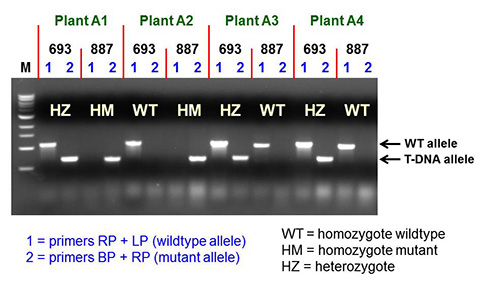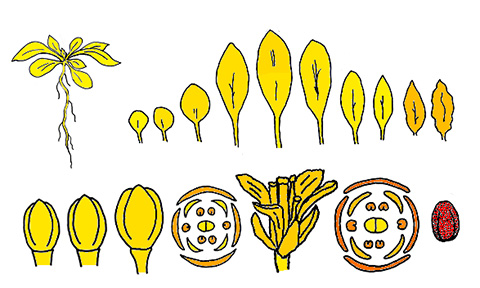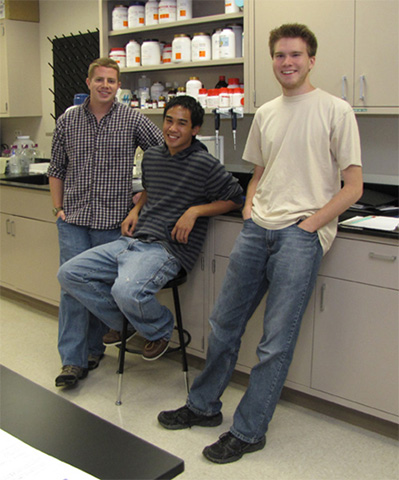Independent Study, Capstone and Honors Research
(BIO 2500/3500/5500/4501/4518/4519)
These courses allow students to conduct an independent
research project and receive credit for it on their transcript or program
of study. All of these require permission of the instructor and a special
course form to be filled out for registration.
BIO 2500, BIO 3500, and BIO5500 are
Independent Studies at the undergraduate sophomore and junior level, or
graduate level, respectively, and can be taken for 1-4 credit hours per term,
with no more than 6 hours counting toward a Bio major or graduate program of
studies and no more than 3 hours counting toward a Bio minor. The area of
your checksheet that they would count under would be determined in discussion
with the department chair. The course catalog does not contain a description
for Independent Study, as the requirements and grading for each study may
differ and are outlined in a prospectus drawn up by the student and instructor.
Each project is unique in consideration of the student's level of experience
and the credit hours received.
BIO 4501 is Independent Research as a "Capstone
Experience in designing and conducting an independent research project.
Students will report the results of their study in the form of a paper
appropriate for publication in a scientific journal and will present a
public seminar on their research." (Undergraduate Bulletin)
Prerequisites for Capstone Research are senior standing
and completion of a junior writing course. This course counts for three
credit hours.
BIO 4518 is Honors Research for the "initiation of
a research project in the laboratory, field, or classroom under the
supervision of a biology faculty member. At least one semester prior to
the start of the research project, the student must formally confer with
a thesis advisor and must also submit and have approved a formal research
proposal." (Undergraduate Bulletin)
Prerequisites for Honors Research is admission to the
Biology Honors Program. This course counts for three credit hours and is
followed by BIO4519 - Honors Thesis.
BIO 4519 is the Honors Thesis following an Honors
Research project and counts for another three credit hours. As part of
this course, "an oral report on the project will be presented in a public
seminar. A written thesis will be approved by a committee comprised, at
minimum, of the thesis advisor and another faculty member."
(Undergraduate Bulletin)
Prerequisite for this course is the completion of BIO4518 -
Honors Research - and the student must receive a grade of B or higher in
both to graduate with Biology Honors. The Honors Thesis counts as a
Capstone Experience.
Procedures:
Students interested in independent research should make
an appointment to discuss their interests and the possible research
opportunities in my lab. Depending on the number of ongoing projects,
funding, availability of lab space, and teaching schedules, it may
be difficult to fit another project in. According to policy, instructors
should not conduct more than two different Independent Study courses per
term. So plan early and be flexible!
Since the research in my lab revolves around plant
molecular biology, I highly recommend that students interested in
conducting an independent research project familiarize themselves with
this subject area and acquire some experience in lab techniques such as
pipetting, centrifugation, PCR and gel electrophoresis. I strongly
encourage volunteering your help for at least one semester before
embarking on your own project to collect some hands-on experience, get
a feel whether the type of bench work we do suits you, and demonstrate
your willingness and capability to "learn the ropes."
If things are working out, the next step would be to fill
out the Independent Study form and draw up a prospectus outlining the
goals and objectives of the proposed research project. These are turned
in for approval by the department chair. In most cases, the second page
of the Independent Study form is sufficient, but in some cases such as
Honors or Graduate research, the prospectus may be more involved.
Expectations:
The university expects that you spend two to three
hours of study time outside of class for every hour of class time. This
means if you sign up for an independent study for 3 credit hours, you
should plan on spending on average 9-12 hours per week in the lab or on
reading and writing assignments related to the project. If you sign up
for 1 hour of credit, you should plan on spending 3-4 hours per week.
Your final report should accordingly reflect the time and effort you put
into researching the topic and conducting your experiments in the lab.
Your grade will be based on your performance on items as
outlined in the Independent Study form and/or undergraduate bulletin.
Typical requirements may include:
- writing and submitting a grant proposal to the Office of Student Research to help
with funding lab supplies needed for the project
- keeping an up-to-date and complete notebook record of all
your work in the lab
- attending weekly lab meetings to report on your progress
and troubleshoot problems you've encountered
- reading papers and protocols related to your project and
be able to summarize and explain them
- reporting your efforts and results at the end of the study,
e.g. in a talk or poster
presentation or in the form of a written report consisting of
introduction, methods, results, discussion, and references
- writing an abstract that concisely summarizes your entire
project
- writing detailed protocols for any new lab procedures you
have developed over the course of your project
Example Projects
Analysis of Plant Mutants: My lab is studying
the function of chloroplast proteins by examining the phenotypes of
mutant plants lacking these proteins (called knock-out mutants).
Many of the Independent Research projects in my lab concentrate on some
aspect of analyzing these plants. This involves phenotype analysis and
genotyping of plants by DNA extraction and PCR to determine homozygous
wildtype, heterozygous, and homozygous mutant individuals. Phenotypic
studies may include microscopy, photosynthesis measurements, and
molecular analysis of plants.

Protein Studies: We are also looking at the
proteins themselves to examine their localization in the plant and
involvement in membrane structure, protein complexes, and photosynthesis.
Examples for projects done by undergraduates in the past include the
expression of a plant protein in E. coli and affinity
purification to generate an antiserum for further experiments, and
analysis of protein expression in plant tissue via Western blotting and
immunofluorescence microscopy using this antiserum. Another project
is using the yeast two-hybrid system to determine the protein-protein
interaction domain and gene activation domain through the use of
deletion constructs of a protein of interest.

Expression Studies: Another aspect we are
studying is the transcription of the genes that code for our proteins
of interest. For some of our genes of interest, we are examining data
from microarray analyses using online databases and bioinformatics tools.
However, not all our genes are included in these datasets. Experimental
projects use real time PCR and promoter-reporter studies to determine in
which plant tissues these genes are expressed.


Undergrads Bryan, Dominic and Colby in the lab during Fall 2011
|

